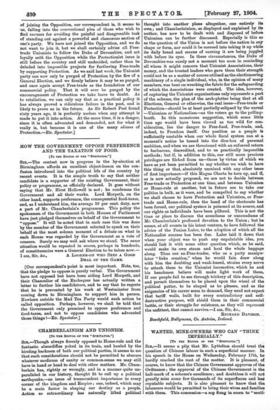CHAMBERLAINLSM AND UNIONISM.
[TO THE EDITOR OP THE "SPECTATOR."]
SIR,—Though always fiercely opposed to Home-rule and the fantastic absurdities yoked in its train, and hauled by the hireling hackmen of both our political parties, it seems to me that such considerations should not be permitted to obscure whatever modicum of sanity or common-sense we may still have in hand or bead to deal with other matters. Mr. Cham- berlain has, rightly or wrongly, and in a manner quite un- paralleled in our history, thought fit to call up a political earthquake,—an issue of transcendent importance to every corner of the kingdom and Empire ; one, indeed, which may be a main factor in shaping our destiny as a people. Action so extraordinary has naturally lifted political thought into another plane altogether, one entirely its own ; and Chamberlainism, as displayed and explained by its author, has now to be dealt with and disposed of before Unionism can be further discussed. Especially is this so as the question of the Union is not before the nation in any shape or form, nor could it be coerced into taking it up while its daily bread and means of earning it are being juggled With before its eyes. In these circumstances, the Duke of Devonshire was surely not a moment too soon in reminding all whom it might concern that Unionist Associations, their money, and the trusted leaders who gave them their strength could not be as a matter of course utilised as the electioneering machinery of a single individual, who, in the opinion of many members, was bent on wrecking the fabric for the safeguarding of which the Associations were created. The idea, however, of capturing the Unionist organisations only represents a part of the scheme, the plan of the arch-plotter being that at all Elections, General or otherwise, the real issue—Free-trade or Protection—should be at least partially eclipsed by the unreal —Unionism or Nationalism—as the voters go to the polling- booth. In this monstrous suggestion, which some little time ago would have been viewed as too wild for con- sideration, lies the danger to Free-food, Free-trade, and, indeed, to Freedom itself. Our position as a people is sufficiently unstable when our whole fiscal system can at a moment's notice be tossed into the dice-box of personal ambition, and when we are threatened with an enforced return to barbarous, discredited, and to us practically impossible methods ; but if, in addition to this, our still more precious privileges are filched from us—those by virtue of which we have as yet been permitted to say whether we wish to have this thing or that, absolutely unmixed with any other issue of first importance—if this Magna Charta be torn up, and if, as is now actually proposed, we are not to decide between Free-trade or Protection at one time, and between Unionism or Home-rule at another, but in future are to take our politics in bulk, as it were, and be compelled to say whether we shall choose to have Protection and Unionism, or Free- trade and Home-rule, then the hand of the electorate has been forced, our political system is poisoned at its source, and our rights as individuals have been pilfered. This is not the time or place to discuss the soundness or unsoundness of Mr. Chamberlain's professed devotion to the Union ; but be seems, at all events in his latest venture, to have followed the advice of the Fenian Lalor, to the adoption of which all the Nationalist success has been due. Lalor laid it down that when your object was to push any unpalatable idea, you should link it with some other question which, as he said, would make its own steam and haul the whole baggage along. Thus our ex-Free-trader, who as a party manipu- lator "licks creation," when he would fain draw along with him the doubting and weak-kneed, strains every nerve to attach them to the Unionist locomotive, which he and his henchmen believe will make light work of them. If our people fail to see through trickery of this description, and permit themselves to be placed upon the wheel of the political potter, to be shaped as he pleases, and as the exigencies of his career seem to demand, they need not expect that tariff walls, built for every contradictory and self- destructive purpose, will shield them in their commercial battle, or their struggle for existence, as they will represent the unfittest, that cannot survive.—I am, Sir, &c.,
RICHARD DAVISON.
Beechfield, Ballymena, Co. Antrim, Ireland.










































 Previous page
Previous page